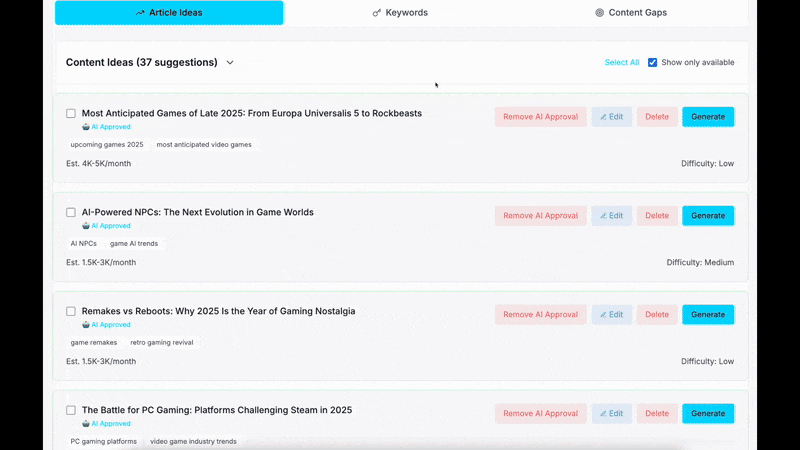White Label SEO Automation: How AI Blog Content Delivers Google and ChatGPT Traffic for Your Clients
Agencies face the constant challenge of delivering high-quality SEO results at scale without overwhelming their resources. White label SEO automation, fueled by AI blog content creation, is transforming how agencies meet this demand. By combining intelligent content generation with automation, agencies can provide clients with consistent, optimized blog posts that drive traffic from both Google Search and emerging AI platforms like ChatGPT.
The Rise of AI-Powered White Label SEO
White label SEO allows agencies to outsource SEO tasks while presenting them under their own brand. With AI tools, this process becomes faster, more precise, and more adaptable to changing algorithms. AI-powered white label SEO services streamline tasks such as keyword research, content creation, technical audits, and reporting. The technology behind these solutions leverages natural language processing (NLP), predictive analytics, and machine learning models trained on billions of data points, enabling them to understand patterns in search behavior and produce optimized content accordingly.
One reason for this rise is the sheer scale at which modern businesses need content. According to HubSpot, companies that publish 16+ blog posts per month generate nearly 3.5 times more traffic than those publishing fewer than four. For agencies managing dozens of clients, meeting this demand manually is nearly impossible without sacrificing quality. AI-powered white label SEO enables agencies to meet these targets effortlessly, ensuring each post is not only well-written but strategically aligned with search intent.
Another factor is algorithm volatility. Google makes thousands of updates annually, and emerging AI-driven search engines like ChatGPT or Gemini are introducing new ways users find information. AI SEO platforms can adapt quickly to these changes by recalibrating keyword strategies, rewriting content to match new ranking signals, and even optimizing for AI answer formats.
Understanding White Label SEO Services
White label SEO services refer to solutions provided by third-party experts that agencies can rebrand and offer to clients. This model saves time, reduces overhead costs, and allows agencies to focus on client relationships and strategy. By outsourcing technical and creative tasks to specialized providers, agencies can maintain a lean operational model while delivering top-tier results.
Key benefits include:
- Scalability without hiring more staff
- Access to advanced SEO tools
- Consistent quality control
- Faster turnaround times
These benefits extend beyond operational efficiency. For example, scalability enables agencies to take on larger contracts without worrying about production bottlenecks. Access to advanced tools means tapping into proprietary keyword clustering algorithms, automated backlink analysis, and competitive research dashboards that would be expensive to build in-house. Consistent quality control ensures that every piece of content meets industry best practices, from keyword density to mobile responsiveness.
Core benefits of white label SEO services
| Benefit | Impact | Example |
|---|---|---|
| Scalability | Handle more clients with same team | An agency growing from 10 to 50 clients |
| Quality | Consistent optimization standards | Content always meets SEO guidelines |
| Speed | Reduce turnaround by 60% | Blog posts delivered in hours |
Scalability
Impact: Handle more clients with same team
Example: An agency growing from 10 to 50 clients
Quality
Impact: Consistent optimization standards
Example: Content always meets SEO guidelines
Speed
Impact: Reduce turnaround by 60%
Example: Blog posts delivered in hours
When automation is layered on top, these services become exponentially more powerful. Instead of waiting days for a blog post, agencies can deliver a fully optimized, brand-voiced article within hours. This speed not only impresses clients but also enables faster experimentation with content strategies, allowing agencies to pivot quickly based on performance data.
How AI Blog Content Enhances White Label SEO Automation
AI blog content creation uses machine learning models to produce relevant, optimized articles tailored to specific keywords and audience needs. Modern AI tools understand search intent, semantic relationships between topics, and Google's E-E-A-T (Experience, Expertise, Authoritativeness, Trustworthiness) principles. This ensures content doesn't just rank—it builds credibility with both algorithms and readers.
Automation in blog content production means agencies can maintain publishing consistency without the logistical headaches of coordinating multiple writers, editors, and SEO specialists. It also allows for more precise targeting of long-tail keywords, which often have lower competition and higher conversion potential. For example, an AI system can identify niche phrases like "best eco-friendly office chairs for startups" and generate an article tailored to that search intent.
Additionally, AI can optimize for featured snippets by structuring content in question-and-answer formats or using bullet points that search engines prefer for quick answers. These same formats are favored by AI assistants like ChatGPT, meaning your content is more likely to be surfaced in conversational searches.
By automating blog content production, agencies can:
- Maintain publishing consistency
- Target long-tail keywords effectively
- Optimize for featured snippets and AI-generated answers
This combination of speed, precision, and adaptability is why AI blog content is becoming a cornerstone of modern white label SEO automation.
Specialized Considerations for White Label SEO Agencies
Agencies should select white label SEO platforms that offer:
- Branded reports to maintain client-facing professionalism
- API integration for seamless workflow automation
- Customizable content templates for consistent brand voice
- Multi-language capabilities to serve global markets
It's also important to assess the provider's ability to update strategies as algorithms evolve. Agencies should inquire about how often the AI models are retrained and whether they incorporate feedback loops from live campaign performance. For agencies working with regulated industries like finance or healthcare, compliance features such as content approval workflows and legal keyword screening are critical.
AI blog content creation is no longer about keyword stuffing. It's about building topic authority and entity-based optimization, which is critical for both Google Search and AI-driven answer engines.
Conclusion: Embracing White Label SEO Automation
Agencies that adopt AI-powered white label SEO platforms gain a decisive edge. They can deliver high-quality, optimized content faster, expand client capacity without increasing overhead, and tap into new traffic sources like ChatGPT. The future of SEO will be increasingly multi-platform, and those prepared to integrate automation will lead the market.
Key takeaways:
- AI blog content boosts both Google and AI assistant traffic
- White label SEO services enable scalability and branding control
- Automation reduces costs and increases efficiency
The next step for forward-thinking agencies is to evaluate available AI-powered white label SEO platforms, test their capabilities, and integrate them into daily workflows. By doing so, they position themselves to not only survive but thrive in an SEO landscape where speed, relevance, and adaptability are the ultimate competitive advantages.
Want to discuss how WhiteLabelSEO.ai can help your agency?






